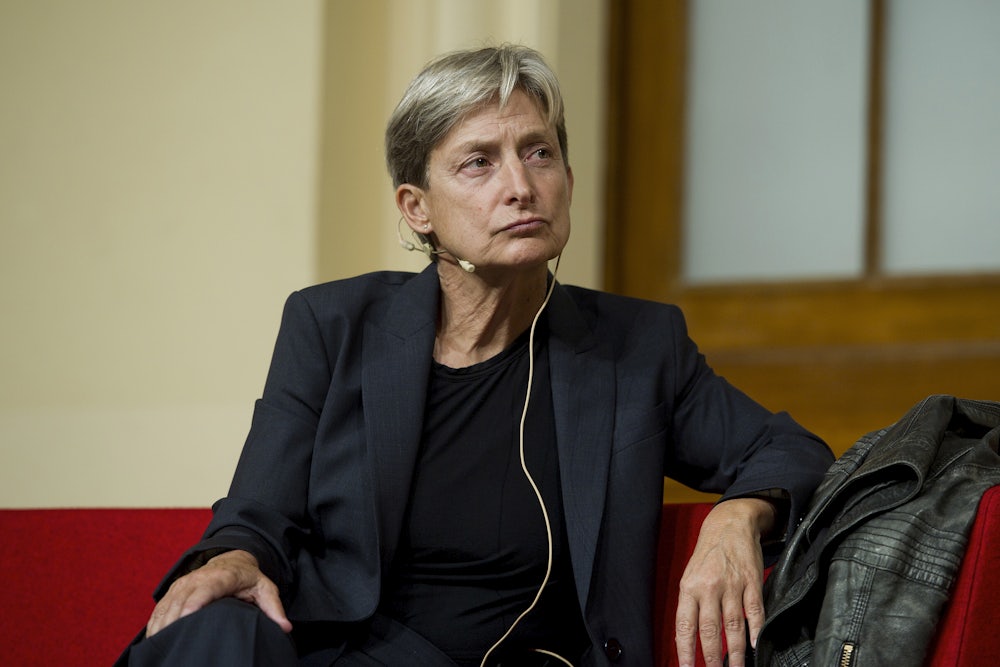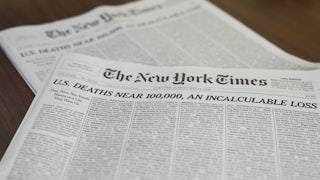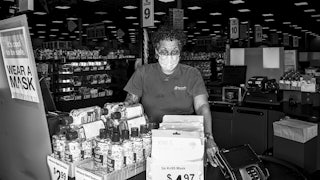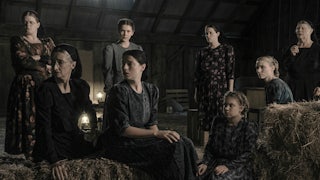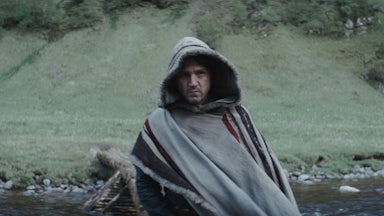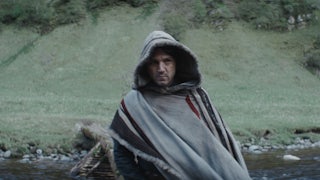When the Covid-19 pandemic hit the United States, Judith Butler was at home in Berkeley, California. In the two and half years since, they’ve reflected on the ways it changed daily life. “I had to stop the spontaneity of my own intimate gestures in order to reflect on whether or not I’m imperiling or am imperiled,” they said.
The pandemic prompted Butler to examine the ways we rely on other people, even as we make ourselves vulnerable to them or our presence poses a risk to others. “We’re connected to each other through touch and even through breath,” they reflected, “and as necessary as they are, to be alive and to feel alive, they also have this power to endanger us and even for some of us endanger our lives.”
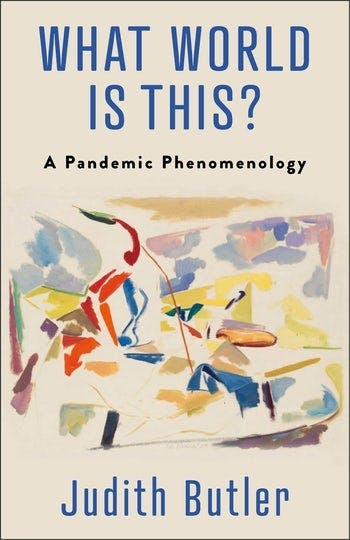
This heightened awareness of what we owe each other is at the center of Butler’s new book, What World Is This? I spoke with them over the phone about closeness, vulnerability, and grief. We discussed how feminist critiques should inform how we think about lockdowns, essential workers, and protest, and beyond the pandemic, our duty to protect the environment amid climate crisis. Our conversation has been edited for length and clarity.
Katie Herchenroeder: These past almost three years have been a whirlwind for everyone—but in different ways. Why did you choose to write a book about the pandemic?
Judith Butler: I think it probably chose me, in the sense that, like everyone else, I found myself in a predicament of isolation and uncertainty, and found myself reflecting on how precious and how dangerous our proximity to other people is. I had to learn how not to hug people or to stand too close, but I also came to fear it, as everybody else did. I think that led me to reflect on the kind of predicament we’re in as social creatures who are dependent on each other and thrive in proximity— we need it for survival and well-being—but also how potentially imperiled we are by one another, under pandemic conditions, when people are passing viruses back and forth. And when we find ourselves unwillingly affected by other people, we’re vulnerable in certain ways.
We’re porous creatures, we take things in from other people, we emit things, and they take it in, and we’re kind of ingesting each other there, and we have to be careful under pandemic times. I think we have to be careful under nonpandemic times too, to the extent that we do have a capacity to injure each other and in various ways we are vulnerable to each other. And then we also savor that vulnerability because it gives us passion and dependency and all kinds of things that we might value.
K.H.: Part of going through this pandemic was relearning a lot. I am curious what your pandemic experience was like and how it informed your writing more generally?
J.B.: I was generally lucky in the sense that I was living in Berkeley, California, and the weather is pretty good. And I was able to go outside every day and walk and enjoy the world. I’m quite sure I saw the neighborhood and the trees and the sky in a completely different way. I also had to stop and slow down and appreciate the world around me. I had to act with more care and caution. So, in some sense, we all became philosophical, reflecting on what we do and why we do what we do and how it affects others and how we might be affected. But even as we were isolated, I think we became aware of our interdependency in a new way, or at least I did.
K.H.: You write so much about that, in this book: about our interconnectedness. And your book also touches on a particularly American understanding of freedom and self-interest, which are often cutting against the collective good. How do you wrestle with that tension?
J.B.: In the U.S.—but also in parts of Europe, and Australia—many people on the left and the right really felt anger about their personal liberty being restricted by governments or by health agencies. Of course, in France, there was a lockdown and there was also police surveillance—like anybody who didn’t obey the lockdown was fined or taken into detention for a while; it was pretty frightening. And some people thought, oh, this pandemic is just an excuse for governments to control our lives even more. And I heard that argument on the right, and I heard it on the left. And kind of both are libertarian streaks, right, that populate the U.S. spectrum of political views.
But I thought, No, this is actually a moment where we can learn something about the ethics of care. And a number of feminists have pointed that out. What does it mean to be part of a mutual aid society or to care about people in your neighborhood or to check in with people who are far away who you know live alone and don’t have company for weeks at a time?
I think that for me, the invocation of personal liberty, like I get to not wear a mask, I get to not be vaccinated sometimes was the rationale for the most destructive possible behavior, like: OK, so what if I get sick? That’s my choice. Like, is it really just your choice? Or is your choice affecting everybody else around you? Are you not just deciding for yourself but deciding for others as well? And if you get ill, what does it mean to make someone else who’s immunologically ill-equipped to fight this virus.… You’re participating in causing death.
So my feeling was that this individual personal liberty rationale was in the service of a destructive behavior, and that it was time for us to rethink the way personal liberty has taken precedence over mutual care or understanding ourselves as interdependent creatures.
K.H.: In the book, you focus on the importance of asking difficult questions in this new different world. What questions are you coming back to right now?
J.B.: It’s been remarked upon before that I ask a lot of questions. And it is true that sometimes, I think, you know, I unfold a problem for myself through revising the question that I am asking. So I wonder, right now, thinking about climate change, climate destruction, and what we might call climate sorrow. What makes for a livable life, not just for humans, but for all creatures, life forms, living processes? Do we know how to live in the world in such a way that we don’t destroy it?
It’s a really hard question because most people in their everyday lives don’t think of themselves as destroying the world. It’s such a kind of large and preposterous claim. But in fact, if you think about our consumer practices and the forms of industrial production that we rely on and we support, or the ways in which we travel because we want to see the world, or the way in which we use plastic in the city of New York, which is just a real shocker, coming from California, we do need to break up our practices and think a little bit more self-consciously of not just how we’re contributing to the possible destruction of the climate and the earth and a livable life, but what we can do to preserve it? What alternatives are there?
K.H.: One of the things I found most interesting about the book is “grievability”—and how grievability exists for living creatures, not just for the dead and dying.
J.B.: Many of us were aware that there were workers in the food industry, the health industry, but also package delivery, who had to go to work because they did not have the means not to work. So they have to go to work in order to live and to feed themselves and whoever is dependent on them. And yet, by going to work, they were also risking their lives and sometimes even dying. And that was just the most painful situation in the world. Because they’re working because they’re trying to live, but by working, they’re at risk of dying. And what does it mean to have that as your psychological orientation toward the world?
Well, one thing it means is that people who are making that choice feel that they’re not taken care of, by society, that there’s no fallback for them, there’s no network of support, there’s no way they can afford not to work. And they understand their lives as not properly grievable. In other words, institutions and economies are not structured in such a way that under pandemic conditions everybody gets a livable wage, everybody’s rent is paid, everybody gets access to health care.
So that experience, like I’m replaceable, I could die and nobody would care, or this society makes no provision to make sure I’m not going to—that, I think, produces a sense of being ungrievable. Like, I am a life whose loss will not be marked, will not be acknowledged, will not be grieved and because if it were, then people would have taken the initiative to produce policies, structures, institutions that safeguard all lives.
In this capitalist world that we live in, we just don’t do that. We let people die. And there are a group of people who know that they can be left to die, they can be sacrificed. And that means that they go through life feeling like they are at least in the perspective of society ungrieveable.
K.H.: Do you see any signs of change?
J.B.: During the pandemic, there were also impressive social uprisings and people managed to march in Black Lives Matter or some extraordinary feminist demonstrations in Latin America, and in Europe, that were carefully crafted and done in a safe and powerful way. The vulnerability of the body is there, but here we are out on the street, demanding that we be allowed to live and that our lives be understood as mattering. Some of these were demonstrations that were actually very moving because they didn’t try to overcome vulnerability to assert some kind of political strength. They used their vulnerability to make a claim about who we are as people and what we owe each other, since we all deserve to live and we should be able to live in a world that values our lives equally.
